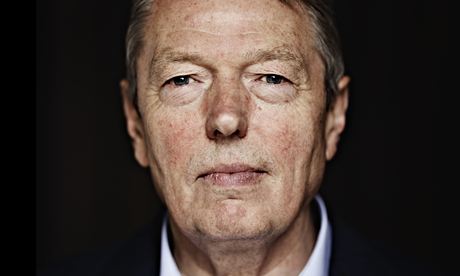
Alan Johnson's memoir of his poverty-stricken childhood has beaten Charles Moore's account of the early life of Margaret Thatcher to win the former home secretary Britain's top award for political writing, the Orwell prize. The Labour MP's much-praised This Boy was named winner of the prize on Wednesday, which goes to the book judges find has come closest to George Orwell's own ambition "to make political writing into an art".
Having already landed the £10,000 Ondaatje award on Monday for the book that best evokes the "spirit of a place", Johnson's memoir steamed ahead of titles, including Moore's first volume of authorised Thatcher biography, Frank Dikötter's take on the Chinese revolution The Tragedy of Liberation and David Goodhart's controversial The British Dream to win the £3,000 prize.
In This Boy, the Kingston upon Hull West and Hessle MP tells of his upbringing in the slums of west London – an area known as Notting Hill now but which, writes Johnson, was known then as "north Kensington, or, to be more accurate, Kensal Town – known to us simply as 'the Town'". He and his sister Linda were brought up by their mother, Lily, in a building with no electricity and a single "decrepit" toilet for all inhabitants. When their father left them for a barmaid, and when, later, their mother died, 16-year-old Linda raised 13-year-old Alan on her own.
Ondaatje prize judge and poet Imtiaz Dharker said on Monday that Johnson "makes you walk the postwar streets with him, smell the sixpenny pie and mash and hear the sound of the meter gobbling shillings in the condemned housing of Notting Hill". On Wednesday, Orwell judge Sue MacGregor said it is "a tale told with great grace and good humour, of what it was like growing up poor in a single-parent family in postwar Britain. It is at once deeply personal and nationally significant, and a highly engaging read." Robert McCrum and Trevor Phillips were the other judges.
In a Guardian review, Chris Mullin judged This Boy "the biography of a politician like no other", saying that "from time to time, one has to pinch oneself to recall that this is not an account of childhood in Victorian England, but of life in the England of the 1950s and 60s." Mullin added: "Far from being a misery memoir, it is beautifully observed, humorous, moving, uplifting; told with a dry, self-deprecating wit and not a trace of self-pity."
At the Ondaatje prize ceremony, Johnson said he had set out to "recapture north Kensington from Notting Hill", as "Julia Roberts and Hugh Grant were not often seen down our way". He added on Monday: "People lived 16 in a house, but you were forced into a community, and [were] looking after people who couldn't look after themselves."
Johnson joins former Orwell prize-winners, including Raja Shehadeh, who took the award for Palestinian Walks: Notes on a Vanishing Landscape, AT Williams, who won for A Very British Killing, about the death of hotel receptionist Baha Mousa in Iraq, and Tom Bingham, who won for The Rule of Law.

